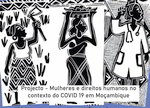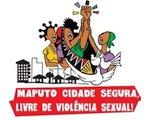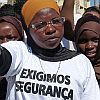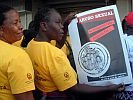Why polygamy is unacceptable in Family Law, in the light of human rights
Terezinha da Silva, Ximena Andrade, Lúcia Maximiano, Benvinda Levi, Maria José Arthur
On the 29th of April 2003, the first discussion session on the Family Law bill was held in Parliament and it was very contentious. The text presented below was written by a group of activists, but was never published, summarising the debate and reacting against the positions of the male and female deputies who argued in favour of including polygamous marriage into the law.
During the debate yesterday in Parliament, some voices argued in favour of incorporating polygamous marriage into the Family Law. This calls for reflection on the arguments developed here and in other public spheres.
Before anything else, we should remember that the legal bases of the legislative proposal under discussion are, firstly, the Constitution of the Republic, our fundamental law. A law that goes against any principle defined in the Constitution is said to be unconstitutional. See article 206, which states that: “Constitutional rules prevail over all other rules in the legal order”.
Secondly, since Mozambique has ratified a number of international conventions, namely, those listed below, they have force of law:
- Declaration of Human Rights
- African Charter of Peoples and Human Rights
- Convention on the Elimination of all forms of Discrimination Against Women (CEDAW)
- Declaration of Children’s Rights
- Convention on Civil and Political Rights
The equality of men and women is unequivocally enshrined both in the Constitution and in these international legal instruments. Therefore, any disposition contrary to this principle of equality and non-discrimination is unconstitutional.
On the other hand, let us reflect a little on what the function of a law is. Should law transcribe reality, as it exists? Should it establish a single rule on paper and oblige everyone to follow it? We think not, because we believe that law should be programmatic and have an educational role, pointing towards an ideal of life while at the same time valorising the country’s wealth of cultural and religious practices, provided that these do not come into conflict with the human rights that our Fundamental Law protects. This is the function of a Family Law: to regulate the rules that govern family law, with equity, justice and respect for the values and cultures of each of us and for human rights. We also want a law that looks towards the future, which is not limited to regulating today’s family life but will go on to serve our children and our children’s children; a law that teaches future generations to live in harmony and with dialogue within the family.
Considering yesterday’s discussion, we need to emphasise the relationship between our Fundamental Law, the Constitution, and cultural and religious rights. Indeed, many of the arguments in favour of polygamy rest on the affirmation that polygamy is part of Mozambican and African culture. But should culture be seen as something static and unchanging? Then how is it that the deputies are sitting in Parliament, an institution that has never been part of Mozambican or African culture? But today we affirm it; the practice of representative democracy and its institutions are integrated as part of our country’s tradition and culture. Does anyone regret this innovation? Surely no one does. So, why try to stop change that can improve the human rights situation in Mozambique, in the name of a culture that is imagined as being fixed in time?
This does not mean that the preservation of our cultures and religions, in all their diversity, is a matter of lesser importance. On the contrary, they are fundamental to our identity, as individuals and as a nation, and it is in them that we recognise ourselves and think of ourselves as human beings. However, we cannot valorise our cultures and religions by overriding the human rights of citizens, whether they are men, women or children, young or old. Our culture should release energy and creativity; it should not be manipulated to oppress and suppress.
What arguments are used to defend polygamy?
It is worth reviewing and analysing the logic of the arguments used by the deputies, both men and women, to defend the legalisation of polygamy. So, we take each one and present it in a format that takes into account two dimensions: (1) identification of the problem; (2) why recognising polygamous marriage might be a solution. These are the results:
Problem: Some women, for whatever reason, cannot have children.
Solution: Polygamy allows a man to take a second wife who is able to conceive and give him children.
Problem: Some women are unable to feel like performing their conjugal duties regularly and the men “suffer”.
Solution: A second wife allows the first one to have more rest, without detriment to the man.
Problem: Some men, like miners, travel constantly and spend a lot of time away from home and from their wives.
Solution: Polygamy allows them to have other wives.
Problem: Women have a lot of housework.
Solution: In a polygamous marriage, women support each other and help each other to look after the children.
Problem: There is a lot of prostitution and many “single mothers” in our societies.
Solution: Polygamy helps to reduce prostitution and the single mother phenomenon.
Problem: Monogamous marriage as defended in the Family Law bill is foreign and western.
Solution: Polygamy is a Mozambican and African tradition and is a “natural” practice.
Problem: If a family law only recognises monogamous marriage, women who are currently second and third wives in polygamous marriages will be made into prostitutes.
Solution: Legalise polygamous marriage.
As can be seen, these arguments are formulated taking into account exclusively the interests, needs and expectations of men, but they represent a real overriding of women’s human rights. We are not talking about human rights in the abstract, but things as simple and vital as women’s right to be respected and heard in the family, to have a say in family decisions that affect everyone’s lives and be able to make decisions with their husbands about their marriage. The proposal to include polygamy in the law threatens these basic rights.
Furthermore, contrary to what the deputies who defend polygamy appear to think, it is not a case of “simply” including polygamous marriage into the Law. In fact, there is nothing simple about such a proposal, because it would completely distort the content of the Law, its principles and coherence. Here are some basic legal issues:
- Conjugal status in unilateral conjugal community (arising from monogamous marriage) takes on a generic status in polygamous marriage – that of a group represented by the husband. The existing unit is no longer the couple, but the family group, led by a head who is the husband. Even if sometimes one of the wives, usually the eldest, has decision-making powers. In either case, there is a violation of principles of equality before the law and between citizens.
- Moreover, only the husband has a choice as to conjugal status: only he can decide whether to have several wives, and not vice-versa. A husband’s unilateral declaration is imposed on his wives or, at best, it is brought about through negotiations with some of them. The wives can never complain or demand divorce, which in this case can never take place. There cannot even be any presumption by the wife in determining the nature of her own marriage, that is, her will plays no part in the choice of her marital status.
- As regards property, there arises the problem of its ownership, management and division, which will be patently imbalanced against the wives, even against the oldest. This ownership, division and management of property will never be based on consensus or common agreement between the members of the conjugal union, which a monogamous union facilitates.
- In a polygamous union, there is no conjugal solidarity and when it does exist it is reduced to dependency of the members on the head of the family.
- The duty to cooperate with each other, morally or materially, and the duty to contribute to domestic expenses are at risk of being transformed into an element of submission of women to new forms of dependence on the head of the family.
- In contrast to monogamous marriages, in polygamous unions the reciprocal rights and duties of the spouses, particularly the duty of fidelity, cohabitation and to cooperate with each other, will never be clearly defined.
Some comments also need to be made about some of the ideas surrounding polygamy, on which the majority of interventions in favour of its legalisation are based. The first of these is that polygamous marriage is a hegemonic practice in Mozambican society, especially in rural areas. In fact, nothing could be further from the truth, in both the city and in rural areas, because polygamy is a diminishing practice.
It is also commonly said that polygamy is only seen in a bad light and not well accepted in cities. It is said that in the countryside women like to live in polygamous marriages because they get help with domestic work, sexual duties to their husband and childcare. This may be true for some, but it is not acceptable for “rural women” to be spoken about as a whole. There is very visible evidence from women in cities an in the countryside, who are unhappy about the lack of rights they have because they are second and third wives. The recent discussion process that women’s NGOs organised as part of the dissemination of the draft proposal and proposal for the Family Law proved this.
The testimonies of a number of citizens who were born in polygamous unions and clearly rebel against the practice are also worthy of note. Instead of growing up in a big, happy family full of children, they say that they suffered differentiated treatment among siblings and that until today they experience trauma because of that situation.
To conclude, we note that if we want to avoid passing unconstitutional provisions in the Family Law, we have only two options:
- We approve that a man can have several wives and that a woman can have several husbands; in such a case, it would be fundamental to define the responsibilities, rights and duties of each of them.
OR
- We approve monogamous marriage alone.







 Information in English
Information in English



















